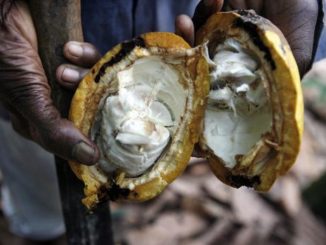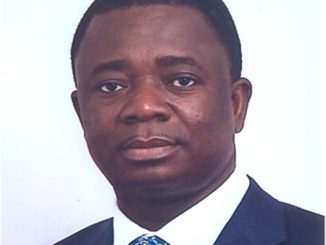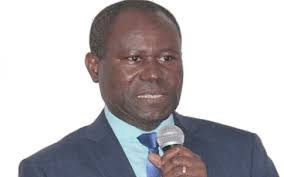Despite the slump in cocoa production from the record one million metric tonnes recorded in 2008 to the low of 696,000 metric tonnes recorded in the 2014/2015 crop season, management and workers of Ghana Cocoa Board (COCOBOD) are fighting over perks, instead of concentrating their attention on how to increase production.
For the past two weeks, the two combatants have been engaged in accusations and counter accusations without providing any shred of evidence to back their claims, as this year’s long drought is threatening the growth of the cash crop.
Attempts by the Minister of Employment, Haruna Iddrisu to broker peace have yielded no positive result, as Dr. Stephen Opuni, who heads the COCOBOD, has reportedly snubbed the invitation.
The Industrial and Commercial Workers Union (ICU) and General Agricultural Workers Union (GAWU) who first fired the salvo, accused the Chief Executive Officer of the COCOBOD, Dr. Opuni of splurging $24,000 on one foreign trip.
The CEO was further accused of using thousands of dollars to renovate his official residence at the expense of the Board. No single evidence has so far been put out in the public domain to support the claims being made against Dr. Opuni by the ICU, except a terse statement that his conduct has been reported to the Commission of Human Rights and Administrative Justice.
The ICU has gone public with the ‘exposure’ because Dr. Stephen Opuni has refused to negotiate the conditions of service of the COCOBOD workers, who are also members of the Union. According to the ICU, they wrote a letter to the COCOBOD CEO which he did not respond. They later got to know that he had dealt with a retired worker, who has been given a contract to negotiate the conditions of service, on behalf of the workers, which to them was illegal.
According to the workers union, when the Minister of Employment on three occasions wrote to Dr. Stephen Opuni, inviting him to a meeting to resolve the impasse, the COCOBOD CEO on all occasions turned down the request. It was as a result of this situation that they decided to blow the cover on the alleged dealings going on at the COCOBOD. The ICU further alleged that some management staff had colluded to secretly sell cocoa, amounting to $10 million.
The destination and buyers of the said cocoa was not mentioned. The ICU and GAWU, however, regretted that workers who expressed concern over the conduct of COCOBOD management are arbitrarily transferred. Neither Dr. Samuel Opuni nor his management team has officially reacted to these accusations.
The Chairman of the disputed Supreme Consultative Council of Cocoa Industry Workers Union, Alhaji Iddris Hassan, who attempted to offer some kind of explanation, also went overboard by leveling accusations against ICU, GAWU and even the Minister of Employment, Haruna Iddrisu.
According to Hassan, when Dr. Stephen Opuni was first appointed by President Mahama, a group of people behind the current agitations by the ICU attempted to scupper the decision of the president. To him, Dr. Opuni reports to the Finance Minister, Mr. Seth Terkper and not Haruna Iddrisu.
To Alhaji Iddris Hassan, Dr. Opuni cannot be forced to attend a meeting called at the instance of Haruna Iddrisu, and also at a time when the COCOBOD CEO was not even in Accra. Efforts made by The Chronicle to speak to Mr. Haruna Iddrisu yesterday proved unsuccessful. The Chronicle roaming reporter, Bernice Bessey is, however, quoting Alhaji Iddris Hassan as saying that the workers who demonstrated against Dr. Opuni were not COCOBOD workers and that the genuine workers love their CEO and would want him to stay in office.
Addressing a news conference in Accra over the weekend, Alhaji Idris Hassan said Dr. Opuni could not have responded to Haruna Iddrisu’s summons, because the issues he had wanted to settle was not between workers and management, but between Cocoa Industry Workers Union, Industrial and Commercial Workers Union (ICU) and General Agriculture Workers Union (GAWU).
“Certainly, management wouldn’t have allowed Dr. Opuni to attend such a meeting because the issue was not about Dr. Stephen Opuni,” he said. Additionally, he noted that COCOBOD CEO answers to the Minister of Finance and Economic Planning. He emphatically said the board was not in crisis, as cited by the demonstrators who were alleged to be workers of West Africa Mills Company (WAMCO).
Industry players who spoke to The Chronicle expressed concern over the turmoil and called for appropriate intervention to salvage the cocoa sector of the economy. COCOBOD came under public scrutiny after failing to sustain and even go beyond the one million metric tonnes of production. The development is being attributed partially to the politicization of the mass cocoa spraying exercise, which reportedly favours farmers who have strong affinity for the government.
Other inputs such as fertilizers, meant to enrich the nutrients in the soil, are also diverted by top officials for sale outside the cocoa regions and even sometimes outside the country. Farmers do not also get the right seedlings for planting.
All these, coupled with lack of motivation, have contributed to the reduction in production of the cash crop, which remains the number one exchange earner for the country. Last fiscal year, the central government had to rely on the $1.8 billion borrowed from syndicated banks in Europe to shore up the value of the then fast depreciating local currency, the cedi.
Source: adomonline.com



